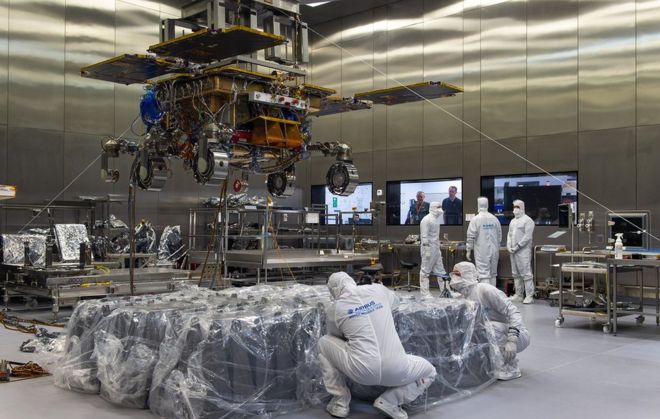The ExoMars "Rosalind Franklin" vehicle was due to launch to the Red Planet in July/August but engineers aren't able to get the vehicle ready in time.
Because an Earth-Mars journey is only attempted when the planets are favourably aligned, the robot's next opportunity won't occur until 2022.
The Russian and European space agencies announced the delay on their websites on Thursday.
The set-back - the latest in a long series for this project - has been signposted for some weeks.
All the hardware is built, but there remains an intimidating list of outstanding checks that must be completed before the mission can be declared flight-ready.
Chief among the obstacles in the timeline are some underperforming electronics boxes in the Russian descent and lander mechanisms that would put the rover safely on the ground; and also the overall flight software from Europe.
Full testing required to achieve confidence in these items necessarily pushes the project beyond July/August.
Matters have been further complicated in recent days by the international coronavirus crisis which has started to disrupt the engineering effort.
"We have made a difficult but well-weighed decision to postpone the launch to 2022. It is driven primarily by the need to maximise the robustness of all ExoMars systems," announced Russian space agency (Roscosmos) Director General, Dmitry Rogozin.
"I am confident that the steps that we and our European colleagues are taking to ensure mission success will be justified and will unquestionably bring solely positive results for the mission implementation."
European Space Agency Director General, Jan Wörner, added that coronavirus was having an impact on the preparations, "because people from different places of industry in Russia, in Italy and France cannot move easily as in the past. So, therefore, there is also an impact, but I would not like to say the coronavirus is the one and only reason - but... it has an impact on the mission, yes."
Launching in late 2022 means the rover will touch down in 2023, given the cruise time to the Red Planet.
Rosalind Franklin has been built to try to detect life, past or present, on the Red Planet.
Because of this, the rover and its instruments have been prepared to incredibly stringent levels of cleanliness. This status must now be maintained over the coming two years of storage.
The project's industrial prime contractor, Thales Alenia Space of Italy, will do this in an ISO-7 chamber at its Turin factory.
"We will have to make sure that we flush permanently the ultra-clean zone and maybe even have to make an outgassing activity to make sure pollutants are all evacuated before making the rover ready again to be transferred to [the launch pad in 2022], " explained Francois Spoto, Esa's ExoMars Team Leader.
Unclear is precisely how much the delay will cost, but Esa's Director of Human and Robotic Exploration, David Parker, said it wouldn't have a significant effect on his programmes.
"We have a budget, which includes a contingency margin for delayed launch to 2022," he told BBC News.
"Of course, that's based on our estimates; we now have to go and negotiate with industry to get the confirmed costs. But that's our normal life - we have to estimate the cost of things, define it and then negotiate with industry. But no, it should not be a financial crisis."
First envisaged as a small technology demonstration mission, the robot vehicle was formally approved by European nations back in 2005, with a launch first pencilled in for 2011.
Then, as ambitions grew and the design was beefed up, the start date was put back. At first, it was shifted to 2013, but further problems saw slippage to 2016, and then again to 2018.
For much of its history, the rover project, codenamed ExoMars, has had to fumble through with budgets that were insufficient to maintain the promised timelines.
At one stage, back in 2009, Esa decided to join forces with America to try to make the mission happen, only to see Nasa walk away three years later when its priorities changed.
That could have killed the project there and then, but for an offer from the Russians to fill the partnership position vacated by the US.
Even with this fresh impetus, however, the project continued to stumble. The Esa-Roscosmos 2018 target gave way to 2020. Now the launch date is being moved again.
The rover has been an important component of British space policy. The UK is the second biggest contributor to the ExoMars programme.
Graham Turnock, Chief Executive of the UK Space Agency, said: "ExoMars is an important, ambitious mission, with the UK-built Rosalind Franklin rover set to help us understand the past environment of Mars and search for evidence of life. To be successful, the mission must be carried out within an acceptable level of risk, so I support Esa's responsible decision to delay the launch for further testing."
















































